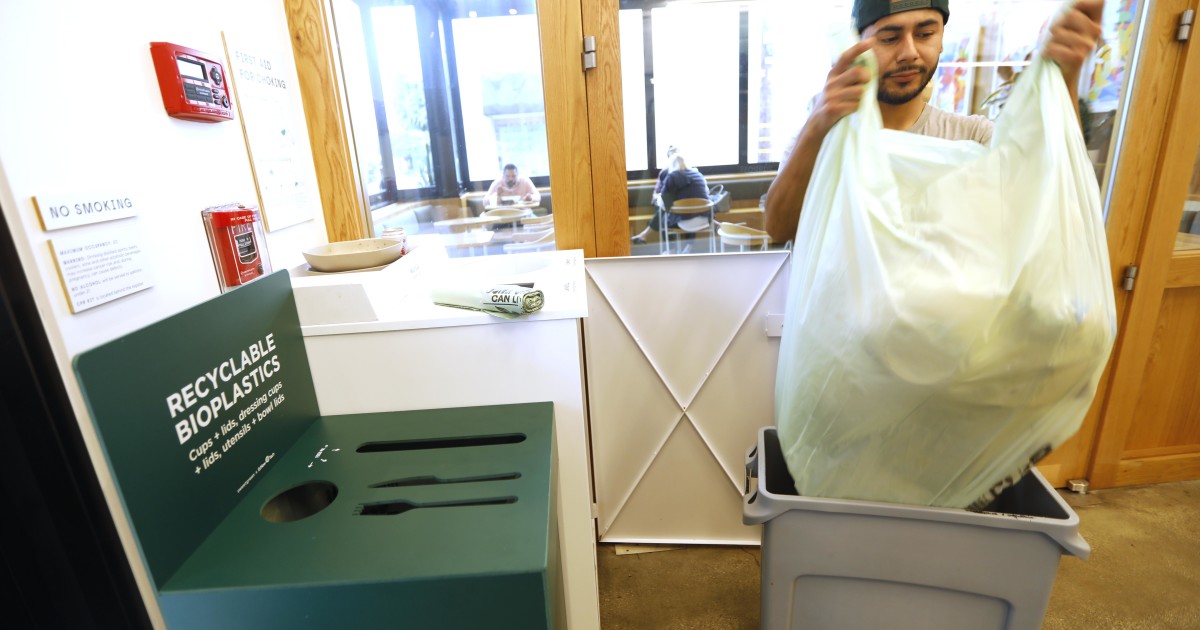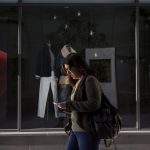
In the summer season of 2016, Sweetgreen government Kevin Quandt bought a confidential suggestion about some thing rotten that was going on within his company’s dining establishments. Or, to be a lot more precise, about a little something rotting that was heading out of them: rubbish.
As vice president of offer chain and sustainability, Quandt was in demand of sourcing elements that went into the Santa Monica-based mostly rapid-relaxed chain’s salads and grain bowls, as very well as its takeout containers, disposable cutlery and cups. He was also in demand of what took place to all the squander collected in Sweetgreen’s then-80 places, most of it consisting of food items scraps, paper and compostable bioplastic.
Considering the fact that 2010, in-keep indicators have assured diners “Nothing from inside Sweetgreen goes to the landfill.” But for most of the time considering the fact that, that has not been fully real. In a lot of of the company’s most important marketplaces, municipal composting was and is nonexistent. Even in which it was accessible, composters normally refused to manage bioplastics, forcing the enterprise to come up with its individual alternatives, of from time to time doubtful efficacy.
In New York Town, the company utilized a broker to collect the organic waste from seven dining places and truck them to a facility upstate. Then an business good friend put a bug in Quandt’s ear: Are you positive this guy’s genuinely using your compost the place he suggests he is? Quandt ran the suggestion past a further trustworthy make contact with, who agreed the vendor was not to be dependable.
It was the type of crimson flag Quandt had been encountering a lot more and far more usually as he went about the Sisyphean process of auditing the company’s squander functions, a job he’d started shortly after joining Sweetgreen from the meal-package begin-up Blue Apron in 2016. Quandt dialed up the broker, who freely admitted he’d been tossing Sweetgreen’s environmentally friendly waste into trash dumps.
“So we labored to section them out,” Quandt claims. “Sometimes you consider you have what you really should be performing, but then you retain digging further and you master all types of points.”
The identical could be stated for the millions of buyers who pay $10 to $15 a pop for Sweetgreen salads and grain bowls, telling by themselves that dollars buys not just a healthful meal but a single that is good for the entire world — the elements organically developed and domestically sourced, the employees rather addressed, the packaging minimum and eco-welcoming, just months away from returning to soil. That is been the chain’s premise considering that 2007, when co-founder Nicolas Jammet and two of his Georgetown College classmates, Jonathan Neman and Nathaniel Ru, opened their 1st spot in Washington, D.C. It now has a lot more than 100, with strategies to double that variety about the up coming a few yrs, and took in more than $300 million in revenue previous calendar year.
Backed by $478 million in venture capital, Sweetgreen has lately been experimenting with shipping and delivery-only “ghost kitchens” and non-bowl foods products, but generally inside of specific parameters. In posters and social media postings, the brand touts its company values of transparency, sustainability and animal welfare. “We’re generally on the lookout for strategies to resource smarter, to make greater conclusions and to support Sweetgreen and its clients be a beneficial drive in the entire world and on the foodstuff system,” the organization claims on a web site of its web site titled “Our Food stuff Ethos.” Sweetgreen has won awareness for revolutionary human sources policies such as furnishing five months of paid parental go away to all employees and an unexpected emergency-hard cash fund for line staff.
But privately, its executives acknowledge how hard it can be to are living up to its beliefs, particularly when it arrives to garbage. The fragmented nature of squander administration programs, the dearth of services that system bioplastics and the quite a few tradeoffs all over cost and sustainability have created it tough at situations for Sweetgreen to match its rhetoric, or even know when it was failing to.
For about 6 months starting in late 2017, the enterprise was trapped applying non-qualified compostable salad bowls immediately after studying the corporation that equipped them had included petrochemicals to its formulation. Sweetgreen solved that challenge in 2018 by getting rid of plastic salad containers and adopting bowls designed of molded sugarcane fiber for all its offerings. But in 2019, the New Meals Financial state claimed that the molded-fiber bowls analyzed good for polyfluoroalkyl substances, or PFAS, a most likely hazardous and non-biodegradable chemical compound. (Sweetgreen states it is doing work on a greater lasting option.)
That guarantee about very little from inside of Sweetgreen heading to landfill? For most of the time Sweetgreen’s been touting it, it was more of an ambition than a warranty. It wasn’t right up until 2018 that Quandt discovered the last restaurant dealing with its compost as trash — a keep in Philadelphia whose landlord refused to make house for an excess trash container in the basement — and figured out a answer, which demanded a courier coming to the keep everyday for a choreographed curbside handoff. “We experienced to get definitely artistic,” Quandt claims.
In a broader sense, it is still significantly from real, considering the fact that most takeout containers, by style, go away the premises — at which place they are overwhelmingly very likely to stop up in the trash. Only about 5% of U.S. homes have obtain to curbside meals squander assortment, in accordance to Cheryl Baldwin, vice president at Pure Strategies, a sustainability consulting business. And even wherever it exists, the greater part of composting services don’t acknowledge bioplastics, which are made from cornstarch and other plant sugars.
“It’s taken a good deal of work for us to get to wherever we are right now,” states Jammet, who retains the title of main thought officer. “There’s only so considerably which is technically in your management.”
Exerting much more regulate over its squander flows is the intention of a 1st-of-its-form pilot program having location at four Sweetgreen places in Los Angeles. In November, the enterprise introduced new focused bins for the collection of cups, cutlery and salad bowl lids. The elements collected in them receives trucked to a facility in Albany, Ore., exactly where they are cleaned, shredded, ground, melted and, finally, shaped back into new utensils, which Sweetgreen purchases.
In the initial 6 weeks of this pilot, the corporation captured components equal to 7,400 cups or 15,000 forks. A specified piece of polylactic acid, or PLA, can go by means of this “closed loop” approach much more than 10 periods prior to its excellent degrades, at which point it can be composted.
The pilot resulted from an unsolicited electronic mail Quandt acquired in late 2018 from a business termed EcNow Tech. A plastics engineer who labored for HP’s ink-cartridge division, Chris Vitello started EcNow in 2009 following increasing issues more than “all the resources in my vocation I’d send out to landfill,” he says.
Nicolas Jammet, centre, co-founder of Sweetgreen, speaks to Joshua Hu, remaining, and Kevin Quandt at the company’s area in Santa Monica.
(Genaro Molina / Los Angeles Times)
For the 1st 8 several years, he focused on creating plant-based mostly and recycled plastics. He only turned his concentrate to recycling PLA — which has to be processed individually from regular, petroleum-based plastics — in reaction to two components: the reluctance of most professional composters to settle for bioplastics, which consider a lot longer to crack down than meals or lawn waste and produce poorer-good quality composts, and the rising price tag of PLA, which is in shorter source many thanks to new restrictions and its embrace by industries keen to project a greener image.
“We understood it’s a shame to deliver individuals valuable raw components to the compost or the landfill,” Vitello suggests. He begun modest, with a neighborhood natural bakery, then went looking for a big shopper that could assistance him verify the idea at scale.
For Quandt, Vitello’s outreach came at an opportune minute. In August 2018, the Santa Monica Metropolis Council had passed a regulation necessitating all single-use cafe components to be “marine degradable,” a term that excludes equally petroleum-primarily based and plant-based mostly plastics. The ban took outcome in July 2019. Enforcement is criticism-primarily based as of the conclude of November, the metropolis had issued only four citations.
A spokeswoman for the city calls Sweetgreen’s initiatives to capture its plastic squander “good news” but notes it does not deal with the concern of have-out things. But the software could make the enterprise a considerably less tempting target for enforcement. And even if not, Quandt suggests, “we imagine it is the appropriate thing to do.”
Additionally, the selling price is right. Sweetgreen purchases the recycled utensils from EcNow Tech at about the same price tag it was having to pay its past supplier. If the pilot goes easily, the next phase will be for EcNow Tech to establish a satellite facility in the Los Angeles location so it can system resources gathered there domestically and skip the carbon-intensive 2,000-mile round vacation.
For a longer period expression, the hope is to phase out the PLA, paper and sugarcane fiber Sweetgreen now takes advantage of in its containers and utensils in favor of even greener resources that crack down far more cleanly or do not demand scarce assets. The firm is learning the feasibility of replacing the paper in its ingesting straws with kelp, says Joshua Hu, supply chain supervisor in demand of packaging and innovation. Wood pulp is also promising, he states.
The toughest part may possibly be discovering a suitable alternative for cups. Sweetgreen removed plastic water bottles in 2017, but it still utilizes PLA cups for chilly drinks, and Hu has not observed a likely non-plastic different.
Over and above company obligation, sustainable packaging is a essential promoting place for the sorts of people today who get extravagant salads. “Consumers treatment additional and more about it these days than at any time,” Jammet suggests. “Because it is something all people touches, suitable?”
Climbing purchaser recognition results in its individual established of difficulties, nevertheless, with ever much more gamers making an attempt to money in on the increase by blurring the distinctions among biodegradable, compostable and qualified compostable. The latter designation signifies it has been analyzed by the Biodegradable Items Institute, or BPI, and will split down in no extra than 120 times in an industrial composting facility. “Biodegradable” simply suggests it will decompose more than 100 years.
When the corporation realized it was employing salad bowls that weren’t fully compostable, Quandt states, “we were being, like, panic button, since which is not wherever we want to be.” It wasn’t until August 2018 that Sweetgreen had a solution, adopting new molded-fiber bowls that experienced the supplemental advantage of doing away with the will need for mixing bowls. Inspite of those practically nothing-to-landfill symptoms, which is where by just about every salad bowl went for months to keep away from contaminating other compost, according to Ryan Cooper, squander division supervisor and organics recycling direct at Rubicon Global, Sweetgreen’s squander management associate.
“There’s a good deal of greenwashing out there,” Jammet claims. “It’s irritating, and it works.”
But when those people BPI-qualified bowls and sporks enter the green bin, it is out of sight, out of intellect for the common customer — and the common business enterprise, too. And haulers know it. To be absolutely sure that Sweetgreen’s squander contractors weren’t all dumping compost into a landfill these kinds of as the one in New York, Quandt had to separately audit the squander stream at every one of the chain’s 80 locations. As leases came up for renewal, he was capable to insert clauses demanding landlords to present organic and natural squander trash containers — a provision that generally enabled Sweetgreen neighbors to get started composting as effectively. Just as vital is creating sure the trash bins are protected enough so their contents do not come to be adulterated with non-compostable refuse.
Now, when the company scouts destinations for new shops, “path of trash” is one of the very first things it considers, Quandt suggests. “This isn’t just ‘put in a bin and we’re done,’” he claims. “We’re preventing a ton of forces listed here.”
It’s a struggle that never finishes. Because of the “big black box of waste administration solutions,” as Quandt places it, the only way to be positive the trash finishes up where it is supposed to is to follow it from source to destination, which suggests periodic reinspections of every single restaurant.
Quandt needs there ended up some type of 3rd-social gathering certification of waste brokers and haulers to get the onus off him.
“At this place, we all just have to just take their text for it, which is kind of ridiculous,” he claims. “I just want to snooze at evening being aware of, immediately after all this function, the truck isn’t just likely to the dump.”




